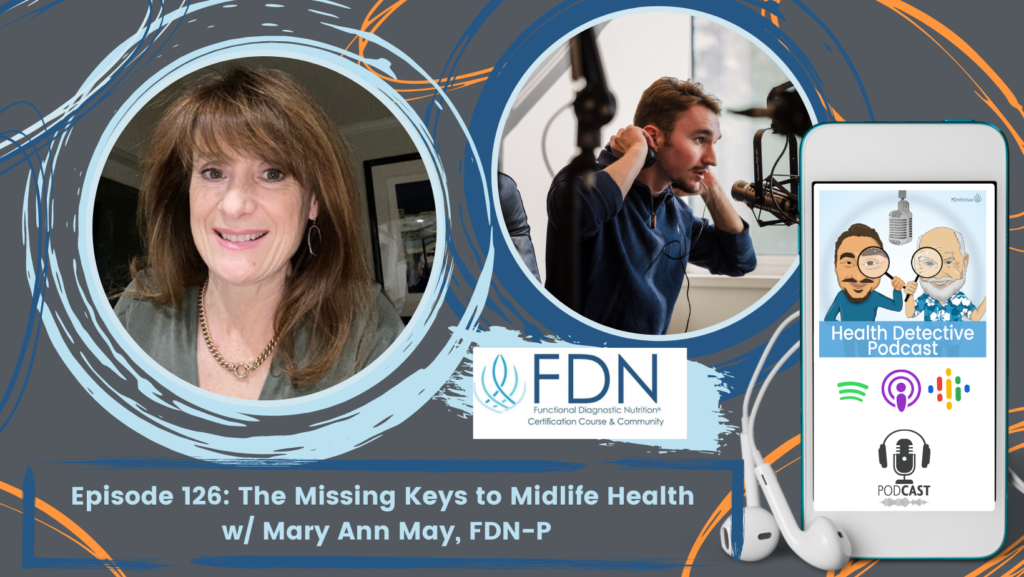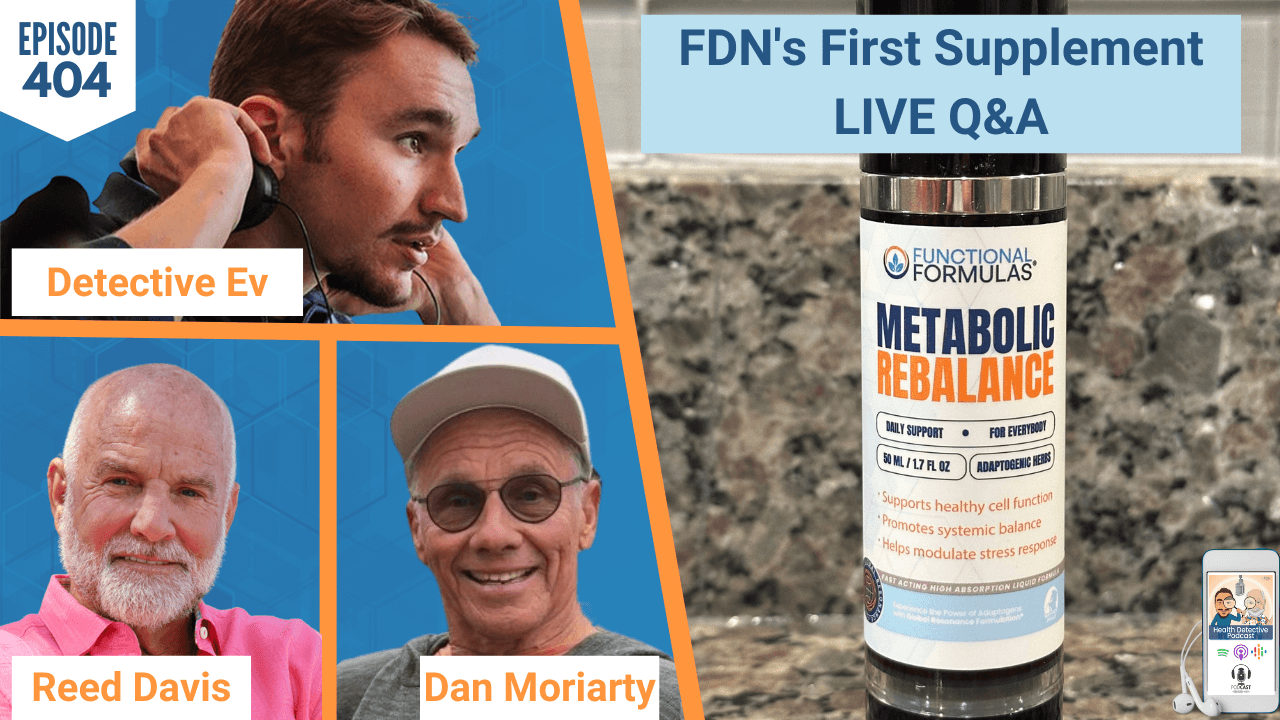Introduction
[00:00:00] Detective Ev: Hello everyone. Welcome back to another episode of the Health Detective Podcast by Functional Diagnostic Nutrition. My name is Evan Transue, AKA Detective Ev. I will be your host for today’s show where we will be talking about the missing keys to midlife health.
We are interviewing people now primarily from Functional Diagnostic Nutrition. And even when we bring on outside guests, we are still focusing on more course content. That’s kind of the shift that we’ve taken with the podcast, because that’s just the demand that the audience has shown. They really want to know more about the course. They want to get a little more technical. We are happy to supply that, that’s for sure.
The guest that we have today is someone who was actually interested in following a true traditional medical route at one point, never fully got into that, but definitely got into studying health that much is for sure.
She has been living a healthy life for over 20 years. For her, that just simply means studying different things and trying different diets. It actually all started out with the zone diet, which we’ll talk about in this podcast. That’s one that’s been around for quite some time.
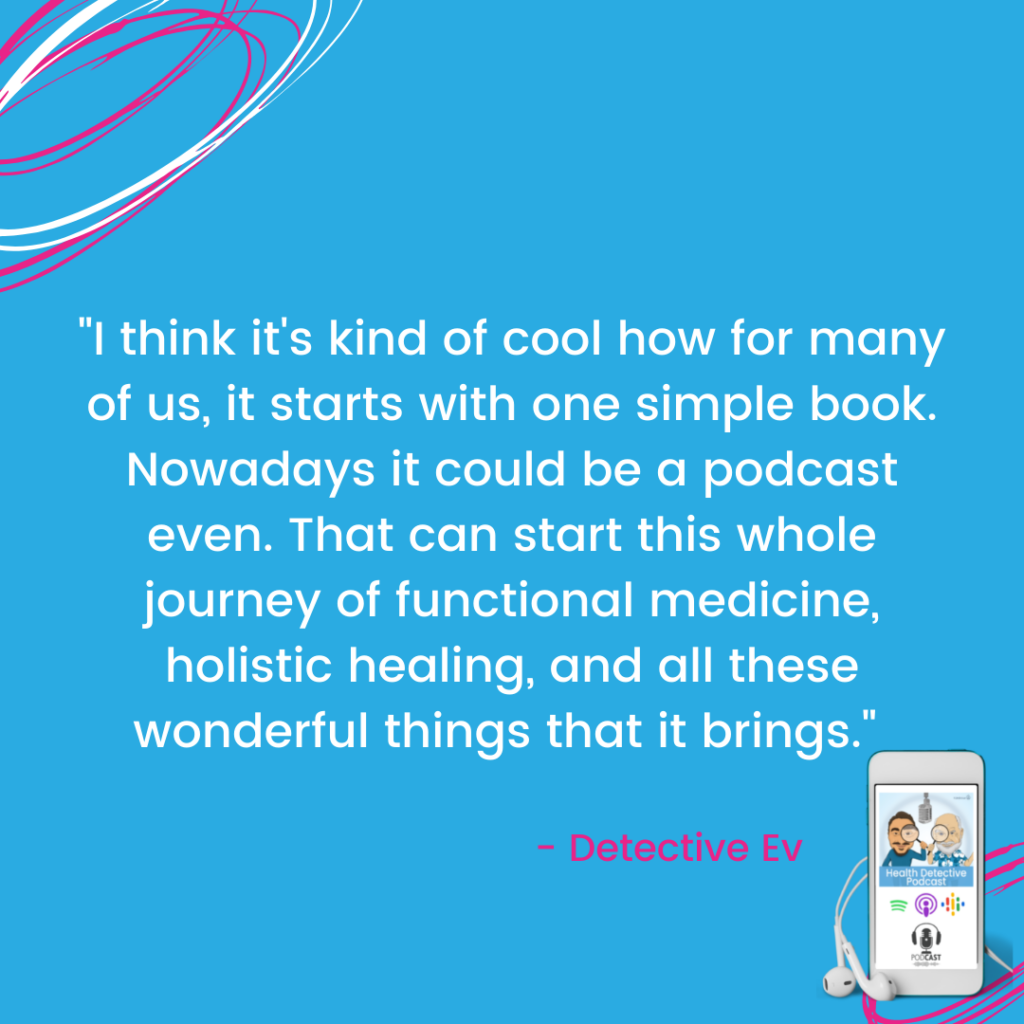
So, I think it’s kind of cool how for many of us, it starts with one simple book. Nowadays it could be a podcast even. That can start this whole journey of functional medicine, holistic healing, and all these wonderful things that it brings. It seems that it’s a never-ending rabbit hole, that’s why some of you have listened to all 130 plus episodes of this podcast. Isn’t it?
About Mary Ann May
We’re talking to Mary Ann May. I was lucky enough to meet her at the founder of FDN’s house, Reed Davis. We actually played Scrabble together along with my girlfriend. It was quite a crazy morning you could say, very exciting, playing Scrabble at 7:00 in the morning.
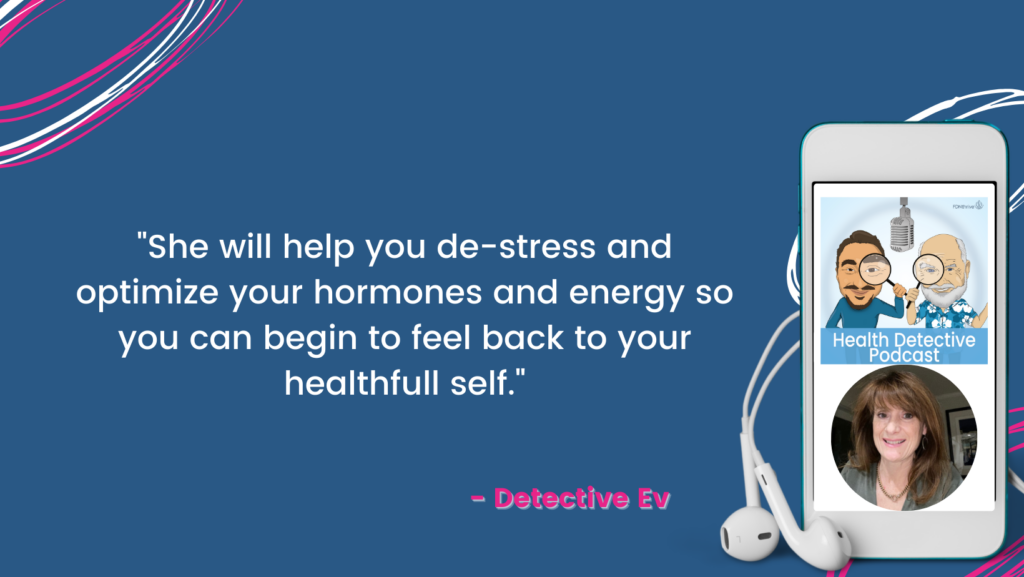
Mary Ann specializes in helping people in their mid-life find the missing keys to their health with an open heart and mind. She will help you de-stress and optimize your hormones and energy so you can begin to feel back to your healthfull self.
I think this is a really important episode. Not only is Mary Ann someone who can really relate to the midlife thing and actually talk about this, she’s someone who’s kind of managing this extremely well and has a ton of energy. So sharp – you can tell cognitively just by the way she talks in this episode. But this is someone again, who’s kind of been doing this for a while. I think the longer that you do this, the more you’re able to kind of sift through a lot of the BS because, unfortunately, there is quite a bit of that out there in this world.
I think you learn, okay, this is kind of cheesy, this diet doesn’t work, that thing doesn’t work. Through all of that over two decades, she has still come to the Functional Diagnostic Nutrition philosophy and is pursuing this as a full-time thing now. She is already doing very well, even though she is a somewhat recent graduate.
So, I’m super excited for this show and to share this episode with you. We took many different routes with this conversation. I think you guys are gonna like it. Without further ado, let’s get to the episode.
Focus on Family Members
All right. Hey there, Mary Ann. Welcome to the Health Detective Podcast. How are you?
[00:02:56] Mary Ann May: I’m great. Thanks for having me.
[00:02:57] Detective Ev: Yeah. I’m excited to talk to you, Mary Ann and I have interacted plenty in the world of FDN. But this is one of these fun podcasts where I don’t really know your health story. I don’t know every little thing about it or things that you might’ve seen family members deal with or whatever. I think that just makes for the most authentic and fun interviews where it’s very conversational.
So, we always start off usually with the same question on this show. The question I want to start off with is as simple as, when did your health symptoms start and what did they look like for you?

[00:03:26] Mary Ann May: Well, I guess for me, I’ve generally been pretty healthy. It was more about really trying to optimize my health. I have a mother who had died of ALS. I watched as she was going down. My father had esophageal cancer and passed away. They were fairly young. My mom was 68. My dad was 73, but his mother lived to 99.
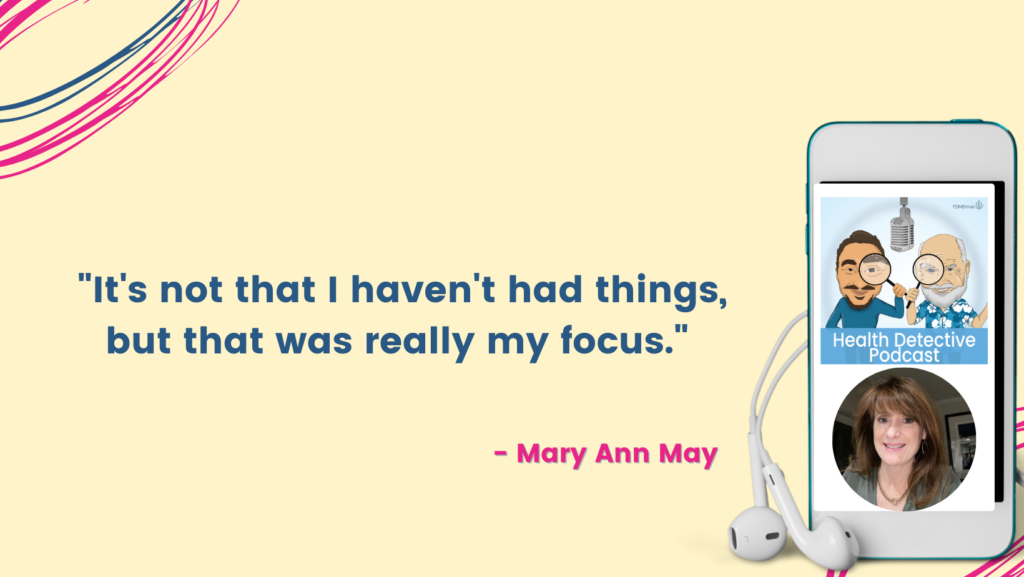
I just thought there are things we need to do in this world to protect ourselves from things that happen to people along the way when they’re not really paying attention to their health. I’m one of eight kids and I’ve been the freak that’s always like, no, don’t do that or not going to do that. It is funny how you come around and some people start seeing what you’re doing and want to join. It’s not that I haven’t had things, but that was really my focus.
ALS: Is it Lifestyle-Based?
[00:04:18] Detective Ev: We’ve had that actually plenty of times on the podcast, hey, I’m someone who’s dealt with health issues and was motivated by it. But I think there’s something even cooler when we see someone else and maybe that’s part of our motivation to get into this.
Now I’m curious to the ALS thing, because I know nothing about that. We’ve had one other person on the show where one of their motivating factors to get into conventional medicine was a parent dealing with ALS. I’m curious, do you believe that’s a lifestyle-based disease? Because I know that one’s pretty serious.

[00:04:45] Mary Ann May: I honestly do think there is an element of that to be very honest. Sadly, there were a few people in my family after my mom was diagnosed with it (even someone my age), who died of it when she was, I think under 50. That seemed to be something familial, but I will even step back from that, that even if you have a genetic predisposition to it.
Leaky Gut = Leaky Brain
I look at genes as being the hardware and how we live as the software. You don’t have to express certain genes and that’s been my whole thing. On top of that, there’s been a lot of evidence that when we have a leaky gut, we have a leaky brain. And when we have a leaky brain, certain things get in there like Epstein-Barr virus and other things that shouldn’t be in there.
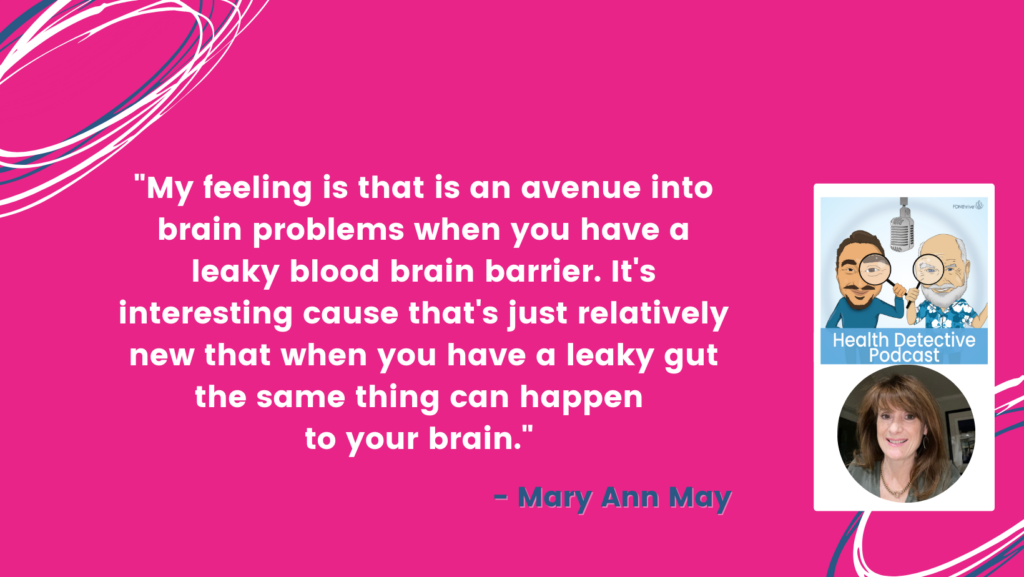
My feeling is that is an avenue into brain problems when you have a leaky blood brain barrier. It’s interesting cause that’s just relatively new that when you have a leaky gut the same thing can happen to your brain. We hadn’t known that for a long time. I think that that really is opening up my eyes to, there are lifestyle things you can do and ways to check what’s in your body to know how best to avoid certain things such as ALS.
Take Care of Your Midlife Health, Shut off the Genes
[00:06:10] Detective Ev: That’s a good answer for people out there that might be experiencing something like that or seeing it in their family. Because the last thing I ever want to do, especially with something I’ve never really looked into, is come from a place of ignorance.
I am sure our natural bodies have some limitations to them. I’ve been more surprised by the limitations they don’t have. I’ve been more surprised about what people come on the show and share. I’m like, you healed what? It’s like, I mean, they’re dying from cancer and then they’re totally fine and they’ve been fine for 10, 15 years in remission. I’m like, okay, I guess that’s possible because you just did it. But yeah, just because something’s more serious, like ALS, you can clearly see like in your family, this genetic type of thing.

Well, why is that not conceptually similar to the fact that my mom had severe cystic acne and thyroid issues and so did? I mean, yes, ALS is way more serious than both of those things, but we’ve resolved these things by taking care of our body. So, can we not shut off the genes for something like that? I don’t know. I’d like to believe that we can. Why not believe that that’s possible, right? There’s gotta be something out there that we can figure out to help those people.
More Familiar with ALS
For those that might be a little confused (cause I always forget not everyone’s in the medical space of course), ALS is also called Lou Gehrig’s disease,right?
[00:07:15] Mary Ann May: That is correct. Right.
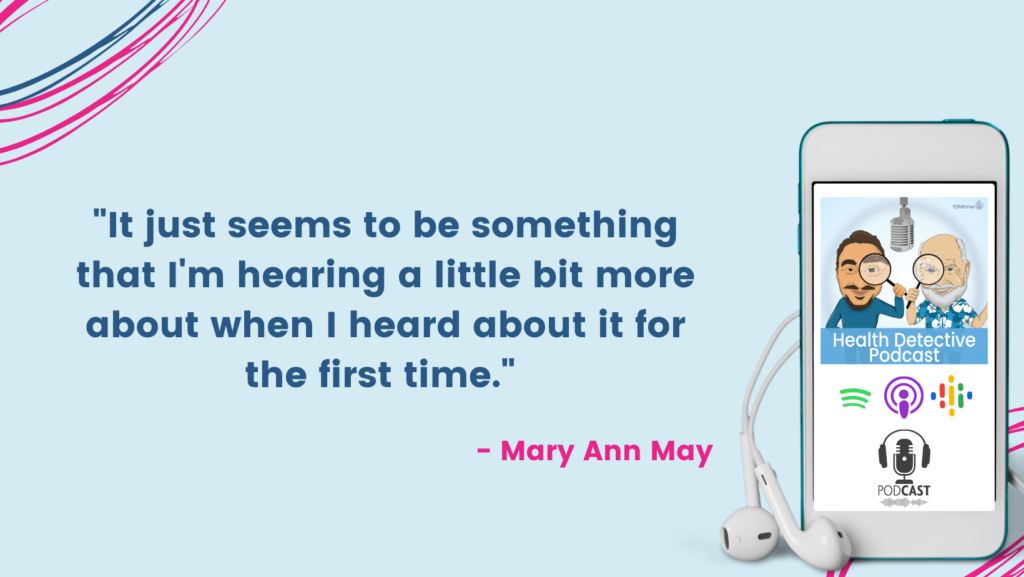
You know, people have heard about that, and it doesn’t take long to find somebody who might be one or two people away from being touched by ALS. It just seems to be something that I’m hearing a little bit more about when I heard about it for the first time. I hadn’t really heard about it from anybody else. But now unfortunately, I’ve heard of several people that aren’t that far from my core that have had it.
[00:07:43] Detective Ev: If I’m not mistaken and I mean this in a good way cause I actually think it was a really good thing that they did. Do you remember that ice bucket thing years ago on Facebook and stuff? That was for ALS, correct?
[00:07:52] Mary Ann May: That was for ALS, and they got a lot of money.
[00:07:54] Detective Ev: Yeah, I’m going to say, I guess that did work because I remembered it right now to this day. And I’ve never really thought about ALS outside of that for the most part.
[00:08:01] Mary Ann May: Right. No, that was fun and cold.
[00:08:02] Detective Ev: Yeah. For sure, right? I wasn’t into my cold exposure stuff back then, so that freaked me out a little bit.
Learning that Food Affects Hormones and Midlife Health
I’m curious, I understand the inspiration for getting into work like FDN, but were you always in the healthcare field or what were you doing prior to FDN?
[00:08:18] Mary Ann May: You know, it was funny. I had always wanted to go to medical school. I was the geek baby who was watching, Marcus Welby, MD, who is aging myself and things like that. I really wanted it, but I was really good at getting in my way. I took a different path. I was in a relationship that was important to me and became my husband and everything. It was just something that got in my way.

I ended up doing a lot of different things. Got my MBA, went to Corporate America. Eventually having kids, I pulled out of the workforce a little bit and then just started dabbling. It was probably in 2003 that I got a book by Dr. Barry Sears, Mastering the Zone. I had just had a baby a couple years earlier and I was reading it. I was like, oh, this was meant for doctors. I said, well, I’m going to get the other book then. And the proverbial light bulb went off over my head when I was reading about how food affects the hormones in our body. That was my first plug to try and do something to see if it would happen for me.
Figure Out What’s Best for Your Midlife Health
I jumped into the zone diet living and all that. All of a sudden, the 10 pounds of my baby weight that I had been carrying for three years happily, like, eh, I’m okay. I can take this, no big whoop. But my husbands on the other side saying, well, maybe you don’t want to do that. So, I’m like, okay.
I ended up doing that and it was interesting because I just was eating 40, 30, 30, which to me made sense. I got other people to do it and they were losing weight. But it was interesting. My energy came back. It was kind of my light bulb that there’s a lot going on with food that really matters. You need to pay attention to it because we all digest food differently and we’re all individual. But there are certain things that we all need. It’s just about trying to figure out exactly what’s your best recipe for creating your health space.
[00:10:15] Detective Ev: On a side note here, because I know our fellow nerds are gonna want to know. I’m actually not sure, when you say 40, 30, 30, is that some kind of macronutrient ratio thing?
[00:10:23] Mary Ann May: Oh, that’s a macronutrient 40%, like the unprocessed carbs, really fruits and vegetables and then 30% lean protein and 30% monounsaturated fats.
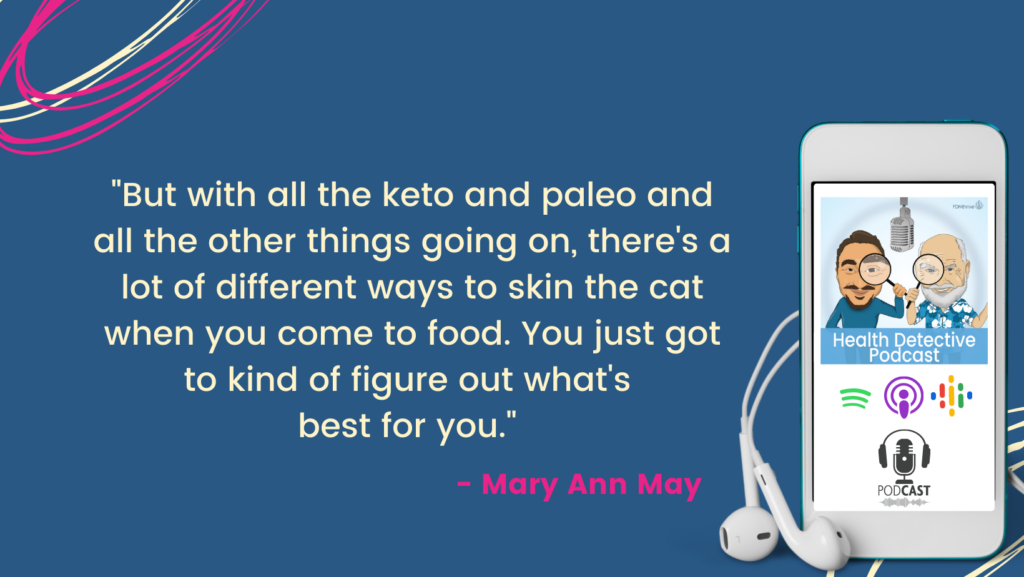
It’s interesting when you do other diets. There’s some success that comes back to that based on certain people, that’s a good thing. But with all the keto and paleo and all the other things going on, there’s a lot of different ways to skin the cat when you come to food. You just got to figure out what’s best for you.
Get Proper Testing to See What Works for Your Midlife Health
[00:10:54] Detective Ev: Yeah. In our world of FDN I’ve heard such miracle stories with the Metabolic Typing. If they actually do it mixed in with like the MRT, it’s cool. For me, it was inspired by Metabolic Typing at one point, because I’m not even always fully in Keto. But I’ve always been a leaner guy, like super lean to the point where it was almost a problem in a sense. I have the opposite problem of most people.
They would always tell me, because I got into weightlifting and stuff when I was younger and trying to be athletic (not going for anything crazy, but trying to get bigger), and they basically say are you eating your body weight in protein? Like in grams of protein? I’m like, yes. Are you eating like 20% fat or whatever it was? I’m like, yeah. They’re like, okay, cool. Then all you need to do, Ev, is just keep upping the carbohydrates infinitely, until you gain weight.

Mary Ann, I was sitting around 18, 19 years old eating 400 or 500 grams of carbohydrates per day and I’m not even past 175 pounds on the scale. It was ridiculous and just so stupid. Now it’s pretty rare I eat more than 100 carbs in a day. I typically could even be below 50. So yes, I do fluctuate in and out of ketosis. But it’s just ironic. I’m not suggesting that anyone out there do that. Get the proper testing. You have to work with a practitioner like us and know the context of everything else going on in your life.
It’s Not a One-Size-Fits-All
But for me, no. I sit around 70% dietary fat, almost 75%. My health subjectively and objectively (objectively being the labs), is better than it ever has been before doing something that was almost the complete opposite of what everything told me online to do if I wanted to get big, gain weight. Now I’m at a healthy weight. I get stronger in the gym if I want. I can control it completely just going away from that mainstream narrative.
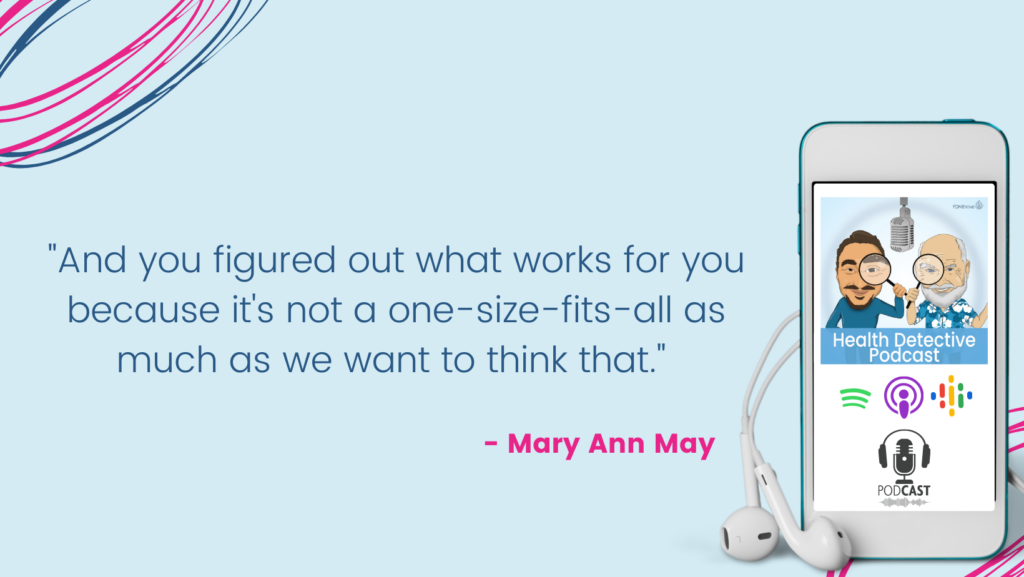
[00:12:23] Mary Ann May: And you figured out what works for you because it’s not a one-size-fits all as much as we want to think that. It takes some experimentation and some will to figure that out, cause sometimes there’s tricky cases.
Living With the Seasons for Midlife Health
[00:12:37] Detective Ev: Yeah. There’s so much context. Now I’m really going off on a side note, but you’ll love this because I find not everyone knows about the light stuff always. Do you know there’s studies showing that when our skin and eyes are exposed to UV light, that we actually become more insulin sensitive? It’s like, why would that happen?
We’ll go figure. Because when are the plants growing? When they’re exposed to UV light in these Tropic areas or whatever. So, as someone who lives in Southeastern PA, I actually will fluctuate. When it’s the summertime and I’m outside, I notice, Mary Ann, I can get away with murder with carbohydrates almost. But in winter, going above 100 for me, kind of breaks me out. I don’t feel as good. And I’ll go right back into that fat mode, ketosis type of thing for winter. I shift seasonally.
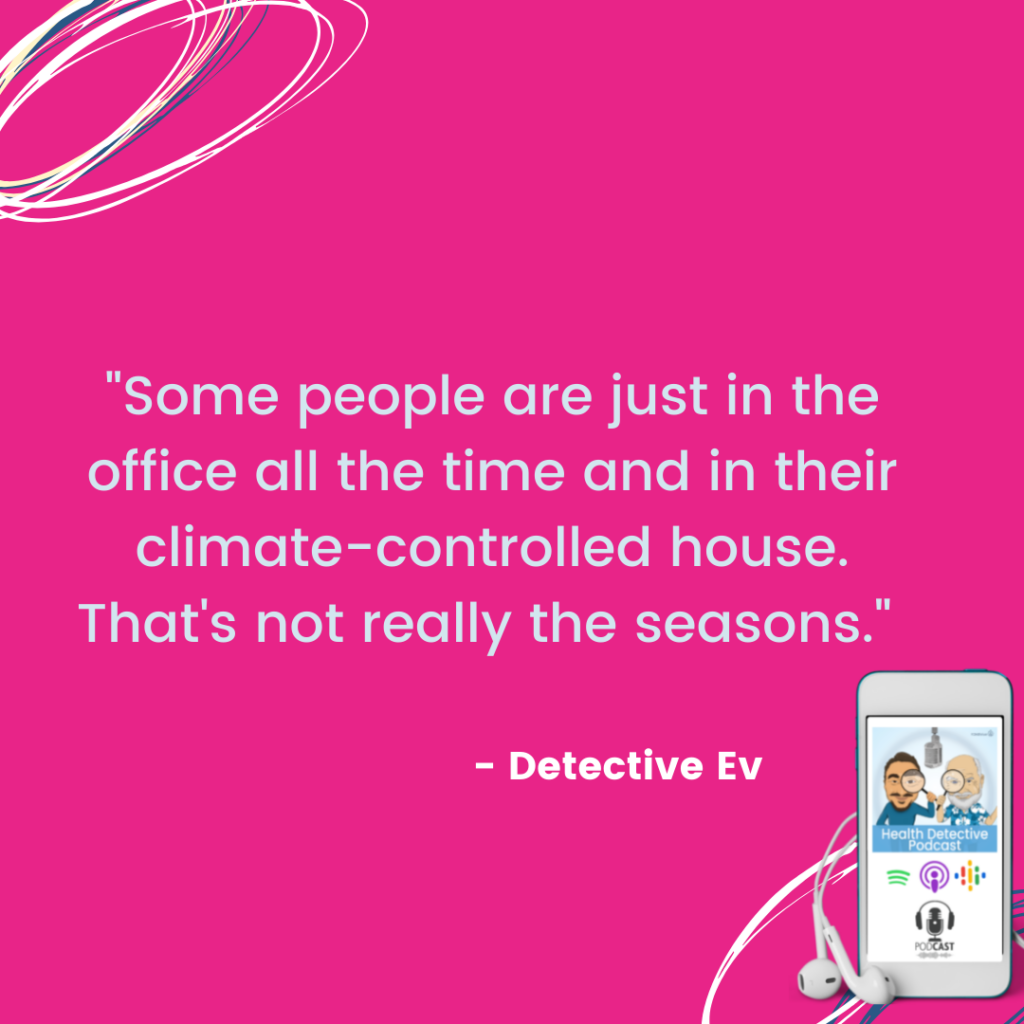
So, assuming you’re actually out there living with the seasons folks. Because some people are just in the office all the time and in their climate-controlled house. That’s not really the seasons. If you’re actually out engaging with it, then I think even eating could be based on that as well. So I digress, but a fun note none the less.
Upcoming 30-day Experiment of 30 Minutes of Sunrise
[00:13:29] Mary Ann May: No, but that also ties into something that’s very important too. The sun, if you’re out in the morning, it can help with circadian rhythm and help with people setting their bodies up for better sleep at night. The sun is our friend in a lot of ways. Yes, you’ve got to respect it and not let it burn you to a crisp. But you need to get some of it in every day.
[00:13:47] Detective Ev: Absolutely.
Yeah. It sucks because I was against these trackers forever. Those of you who aren’t watching on video, I’m holding up a Fitbit right now. But I finally pulled the trigger and got one. I find it so interesting to see the different things and how it affects my sleep.
Now I’ll never really be able to go back, because I’ve been catching sunrise for almost four and a half years after I learned the benefits. But my girlfriend right now, who’s an artist, who stays up, (not late, but she’s always in artificial light), she loves the stuff that we’re doing. She loves data or whatever. I’m like, would you be willing to kind of do a 30-day experiment of 30 minutes of sunrise? She’s like, yeah. She has a Garmin watch.
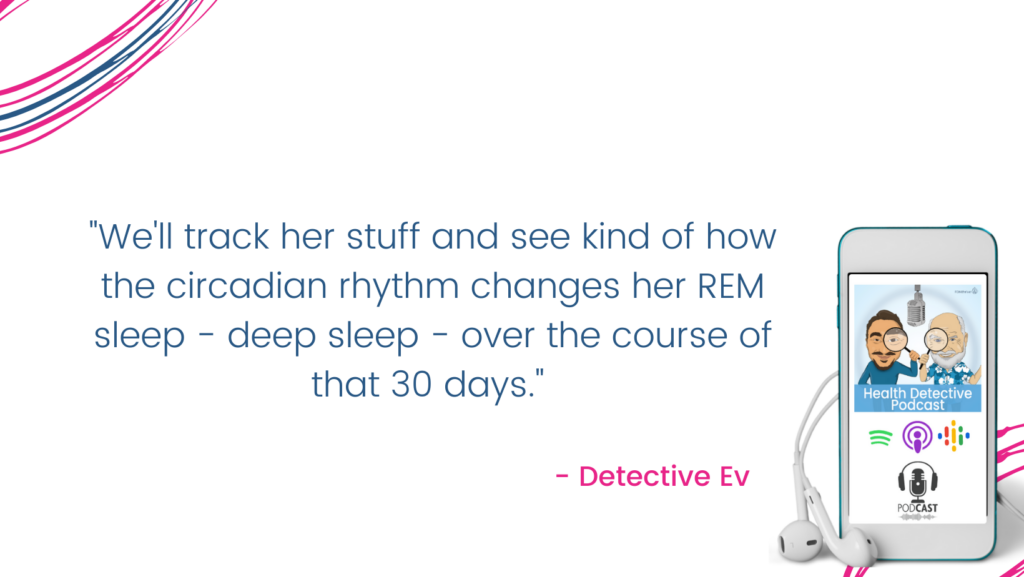
I’ll share that with FDN. Of course, you’ll see this. And I’ll share it with our people on this podcast. We’ll track her stuff and see kind of how the circadian rhythm changes her REM sleep – deep sleep – over the course of that 30 days. I’ve never had a really good guinea pig that I know is going to stick with it for the 30 days and hasn’t really done it at all beforehand. So that’ll be interesting.
Catching Sunrise Has Been So Beneficial

You’re totally right about the light stuff – catching sunrise. I don’t know how to describe this to people. You really have to get into the literature because otherwise it’s kind of hard to believe. That has been probably one of the best things I’ve ever done for my health, up there with removing gluten, up there with removing dairy. I’m just saying. People can do what they like, but that really has worked well for me.
[00:14:57] Mary Ann May: And for those who have a hard time getting up, just try and do it just as an experiment. I’m one of those people who like to get up a little bit after sunrise. It’s something to do it, but it’s worth the effort just to experiment.
[00:15:10] Detective Ev: All right. So going back to your story with FDN, you start off like so many people. You’re reading a book about this stuff and it’s sparking this interest. I find that so many people end up doing their own research. It’s one or two books that really gets this journey started.
[00:15:22] Mary Ann May: You’re absolutely right. That was the first book.
Then, I kind of worked on my family and I was staying up really late at night cause I had the right dose. Then my husband was like, hey, get me on that, cause he was always doing carb pushing for workouts and stuff. I said, no, you could eat this way and work out whenever you want and all this stuff. It ended up working out.
Hungry Girl
The really fun story about that actually was my daughter had just gone to kindergarten that fall and I hadn’t really gotten my kids so much into it. I’m the mom who’s thinking Raisin Brand is good for you and I’ve watered down your juice and you’re ready for the day.
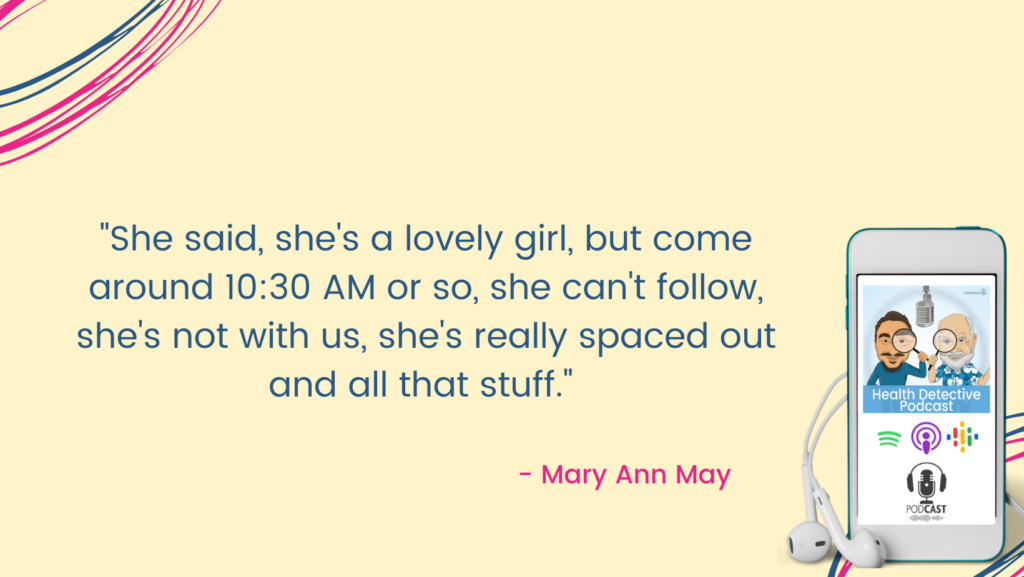
It was a half-day kindergarten, and she come off the bus as nasty as could be throwing her backpack down and “I’m hungry” and all this stuff. It was really funny because I went at two weeks to see how kindergarten is going with the teacher. She said, she’s a lovely girl, but come around 10:30 AM or so, she can’t follow, she’s not with us, she’s really spaced out and all that stuff. I’m like, this is a high achieving kid from my experience at home. So, I’m like, what’s going on?
I went home. I decided, I’m going to make an egg white omelet for her, give her some strawberries and some peanuts, and send her on her way. Well, she was coming off the bus sweet as can be, “Hold my hand, mom.” And she wouldn’t ask for food for like an hour.
Then at the quarter of the year, we went back to see how the year was going. The first thing the teacher asked me is what drug did you put her on? She is a completely different kid. She is here, she’s on, she’s doing everything. And I just said, I changed her breakfast. She goes, what? She had no belief that I was telling her the truth. But in time she saw that that was the kid, all year.
Artificial Lights & Horrifying Food
[00:17:07] Detective Ev: Oh man, I love that you shared that story. I work in schools, you know that I think, and I see these kids with these mental health issues and this stuff.
You forget what it’s like until you go in there. They got like the nastiest fluorescent artificial lights. Which by the way, guys, there are studies specifically on classrooms and behavior of the children in those classrooms based on the light that they’re under. That’s real. Studies been done since 1973 on that type of stuff and yet we still use crappy light.
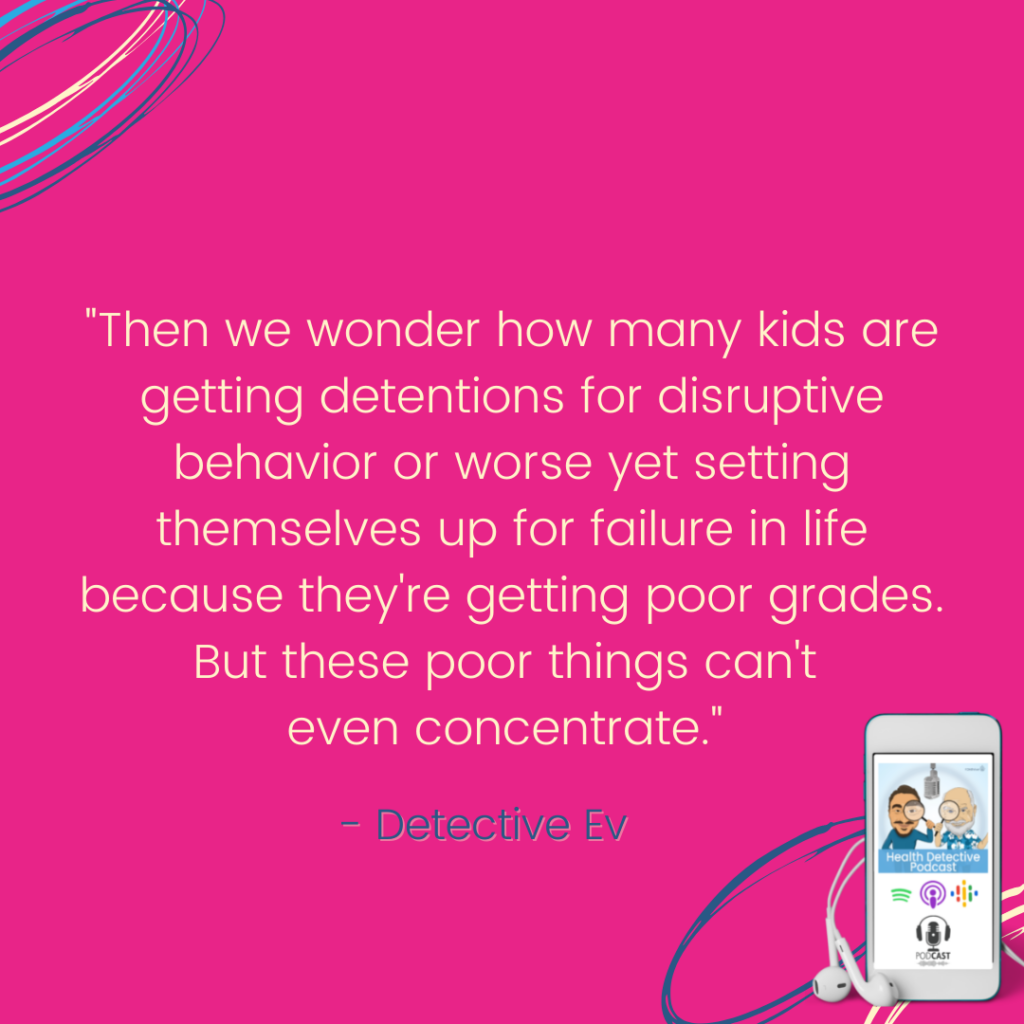
Then don’t get me started with the cafeteria. God forbid. That’s even more horrifying. Then we wonder how many kids are getting detentions for disruptive behavior or worse yet setting themselves up for failure in life because they’re getting poor grades. But these poor things can’t even concentrate. They can’t focus. They’re miserable. And they’re not conscious like us to know, oh yes, when I eat this way, I feel this certain way because my blood sugar is normal. What seven-year-olds thinking like that?
[00:17:56] Mary Ann May: No, absolutely, unless they’re being guided. Because, of course, the funny thing was with that kid, someone picked her up after school. She was given a peanut butter and jelly sandwich and she said, excuse me, to the mom. She’s just, have you ever heard of protein? She called me and said, what are you doing with this kid? I’m just like, she knows she needs it. That’s so funny. It was, it was really like, okay, my kids know what they need to do.
Being the Detective for My Kids and for Midlife Health
[00:18:19] Detective Ev: In terms of you eventually finding FDN, I don’t think we covered that. Was that just like online searching or how did you find out about us?
[00:18:27] Mary Ann May: It’s interesting because I read another book back in like 2015, which was Missing Microbes by Martin Blaser. That really just shocked me all about the health, the gut, and everything. I knew that was a big deal. So, I started really paying attention to that, reading things, and I did a couple of health coaching things. But it wasn’t exactly reaching me where I wanted it to be.
It was information, yes. But I was getting that from a lot of books and things like that and webinars. Then I was at a conference where FDN was a sponsor. I’ll be honest with you. I had just finished another health coaching thing, and I thought, no, no, I’m not even looking at it. Forget it. I’m not doing it.
Well, it turned out after this weekend conference, one of the conference people had a masterclass with Reed Davis. I tuned into that video of him talking all about what FDN was. Another light bulb went over my head, and it was like, okay, this is what I need. He talked about the data you get from the labs and how you work with people to figure out what’s for them, and really correlate what’s going on. That just was all I wanted.
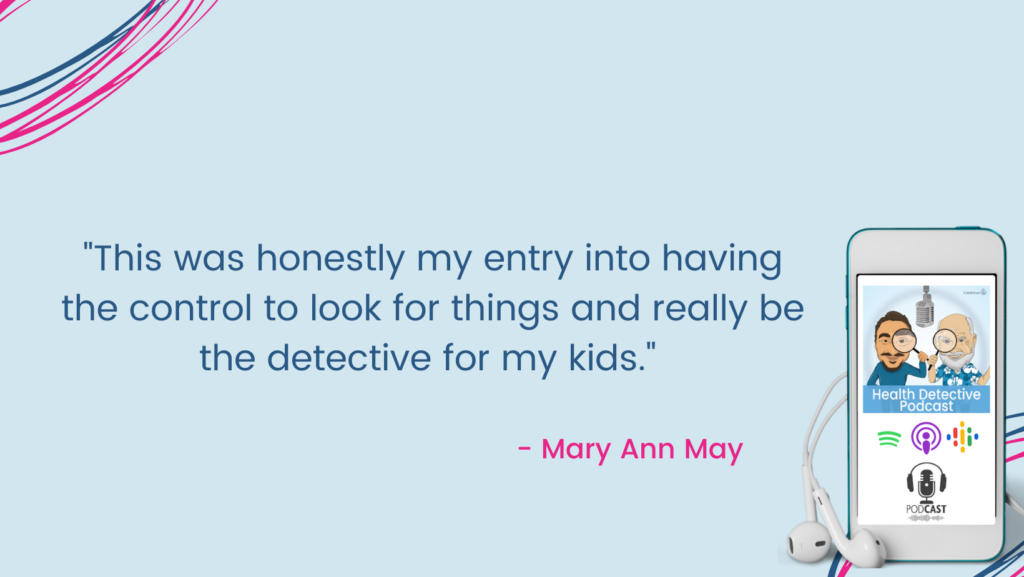
I mean, I was trying in the past to, how can I get these tests for my kids? I know we need to check her gut and things like that. This was honestly my entry into having the control to look for things and really be the detective for my kids.
Elevated Mercury in Midlife Health
I thought I’m gonna run a business on this. So, I’ve got a few clients now, and I’m just starting to roll out because this is just life changing.
When I went through the course, I had to do all these tests. I learned some things about me that, you know, I’m feeling fine. I feel great. Oh, well, you’ve got E. Coli in your gut, and you’ve got this in your gut, and you’ve got this in your gut. And I’m like, what? Okay. So, you have to treat that.
I had a congested liver, it said in one of these tests. And I thought, how in the world? But in my head, I knew that I had had amalgams in my mouth for like 40 years, and four years earlier, I had taken them out.

So, I ended up listening to someone through FDN talk about getting tested for mercury. I had that test done just earlier this year. Sure enough, my mercury is off the charts.
Detective Ev: Wow! On the HTMA?
Mary Ann May: No, I did the Quicksilver blood Tri-test. I saw my methyl mercury, which was based on fish was really elevated. I don’t eat a lot of fish because of the whole mercury thing. I was able to get somebody talking to me about the results. She basically said that the mercury is in your tissues. And the inorganic, which were the ones from my mouth, were still elevated, but not quite as high as the fish. I saw, okay, that’s probably why my liver is congested.
Detoxing Mercury in Midlife Health
A sidebar, I can’t really tolerate alcohol real well. So that’s not a huge thing for me. I have this ring, this Oura ring, and my sleep gets totally disturbed and I feel terrible after just one cocktail or one glass of wine. I was just like, all right, something’s not working in my body right.
Basically, I have been on a mercury detox now through Quicksilver. I’m on the second phase. I’m not real sensitive, they have three different ways you can do it. You can do it over three months, two months or six weeks. I’m doing it over six weeks and I’m only a third done with it. So, it’s a lot of supplements and botanicals to try and get the mercury out of your system.
[00:22:16] Detective Ev: That’s cool. Well, not cool that you had it.
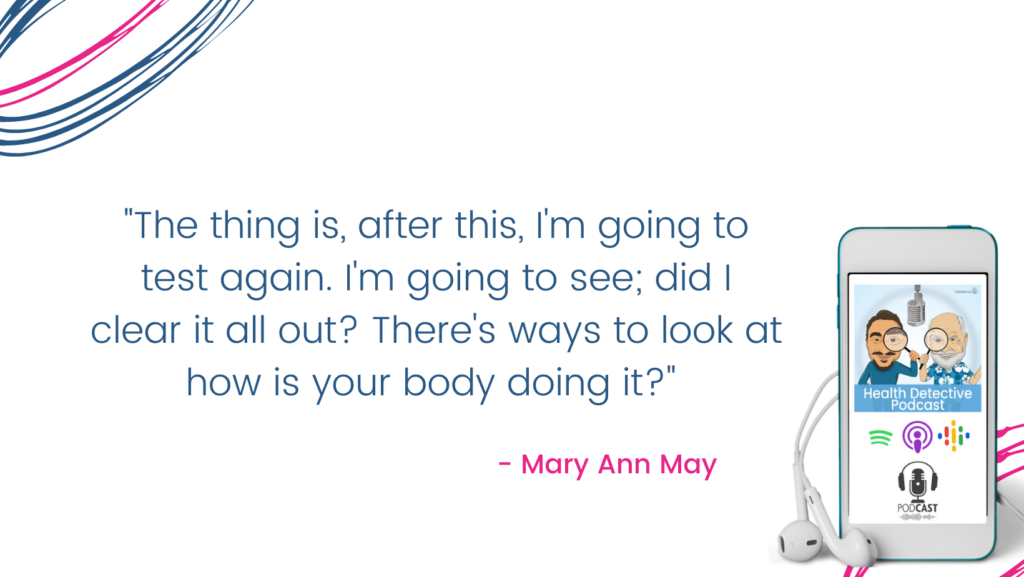
[00:22:20] Mary Ann May: No, it’s cool that I knew. The thing is, after this, I’m going to test again. I’m going to see; did I clear it all out? There’s ways to look at how is your body doing it?
So, if I’m clear, I’m going to eat fish again, and I’m going to have a glass of wine here and there. Then I’m going to test again in six months. If it shows that I have more of that stuff in there, it shows that I don’t have a good detoxification system for it. And I’m going to have to do no fish and no alcohol, which, you know, if that’s what I have to do, I have to do.
Binding with Chlorella During Midlife Health

I like sushi. I like other things. I’m going to have to figure out a way to live with that. There’s certain things that you can take after fish. Chlorella and other things are supposed to bind things. When I’m going to be challenging after I’m done, I’m going to be using those things to see whether or not I need it. If it will keep me clean, to be honest.
[00:23:15] Detective Ev: Shameless plug for someone we had on the show, Catharine Arnston of Energy Bits.
Mary Ann May: That’s what I’m doing!
Detective Ev: I gotta be honest. My girlfriend Maddie bought them; she didn’t even tell me she bought them. She’s like these things work so well, I heard one of the podcasts. She bought this $100 bag, loves them to death. Then she brought them to me, and I tried like 15 or 30 of them the first time, I can’t remember.
It was subtler for me. It wasn’t like, whoa, oh my gosh. Everything’s better.
It’s probably because I’m into health stuff already. I said to her, I’m like, wow, doesn’t it seem like I’m talking a lot more. We were traveling, it was exhausting. She’s like, yeah, you seem like you literally got a pick me up type of thing. So, if that’s possible, I think that’s amazing.
You’re also replacing a lot of other supplements with that. It’s not the price tag that people would think initially. Like, oh my God, one supplement is this much. Well, it’s not really one supplement in a sense, like you’re getting a lot of different things.
So yeah. Great product that she’s designed over there. All you have to do is listen to her podcast to realize it’s worth it.
Spirulina for Energy in Midlife Health
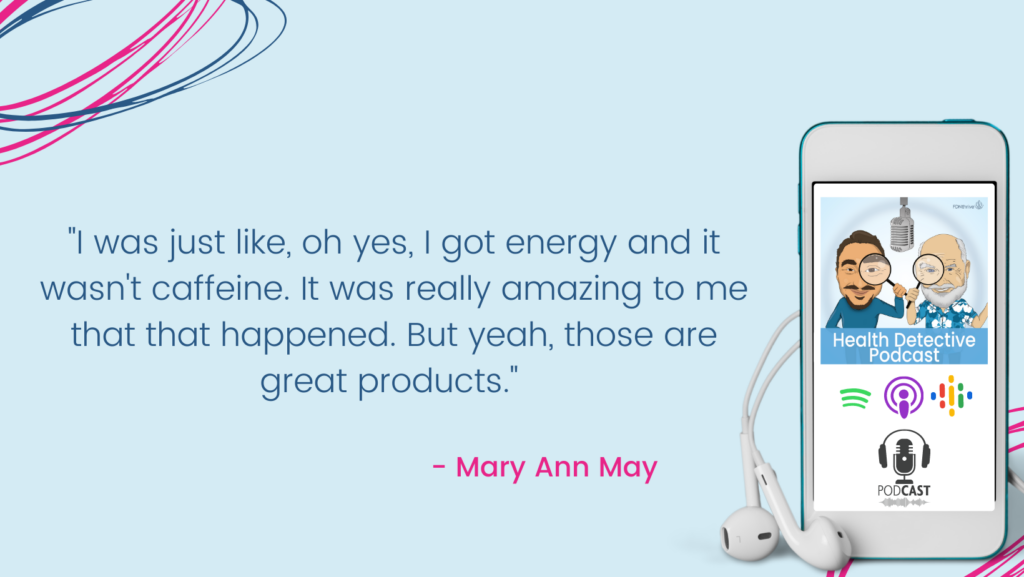
[00:24:10] Mary Ann May: It’s really funny because the spirulina one is supposed to be for energy, it’s energy bits. It was funny cause I had been taking five here, five there, whatever. Then I was traveling this weekend and I bought these little bags that have 30 in them. I took this bag of 30 of them at about four o’clock before going out with my daughter. It was mom’s weekend at her college. I was just like, oh yes, I got energy and it wasn’t caffeine. It was really amazing to me that that happened. But yeah, those are great products.
[00:24:41] Detective Ev: It’s just cleaner. It feels a lot better. So very cool. That was not intended at all. You literally had them within arm’s reach. That’s amazing. That’s how it goes sometimes.
I’ve had someone before, I’m like, I wear like the blue light blocking glasses at night. And like she whips them out. That’s what’s fun about talking to FDNs.
Cortisol, Hormone, & Digestion Work in Midlife Health
I know that you already touched on it. You actually beat me to a lot of the questions there, which is cool. Did you find anything else major? I know that you said the E. coli in the gut, the backed-up liver. Was there anything else that popped up?

[00:25:05] Mary Ann May: My cortisol was messed up and some of my sex hormones were messed up, but I kinda knew that. I haven’t done my retest yet because that’s in May, I will do most of my testing again.
But I am a good sleeper and I’m sleeping well, and I feel well. I just feel like my digestion really got better because I knew something was wrong with me. After eating something before the test and telling my kids, if I got something in my gut, it’s from this meal. It was from a good restaurant, organic stuff, but it was an old piece of lettuce. I’m trying to eat really good and saying, oh, if it’s bitter, I’ll just expand my palette, keep going.
Then at the bottom, I was just like, oh, that wasn’t what I should have eaten. So, I’m pretty sure I know where that came from. But a whole host of things. When your gut is open, because you’ve got a dysbiosis, you’re basically letting the environment welcome in all these bad players. So, it wasn’t just E. Coli, it was different things. I feel a lot better.
Food Matters in Midlife Health
It’s interesting, I have had the test given to some of my clients. And one of my clients, she’s got a parasite. She’s just like, what do you mean I’ve got a parasite? I’m fine. I’m just like, maybe not. She’s got fatigue and she’s got some acne and some other things. We’re just like, well, let’s clean up your gut and see if we can clean up some of these other things.
You walk around thinking everything’s fine until you test things that aren’t generally tested. I mean, I go to my doctor every year and I’m told I’m fine. I’m fine. I’m fine. I go, and I find these things under the radar that aren’t fine, that are going to lead to things.
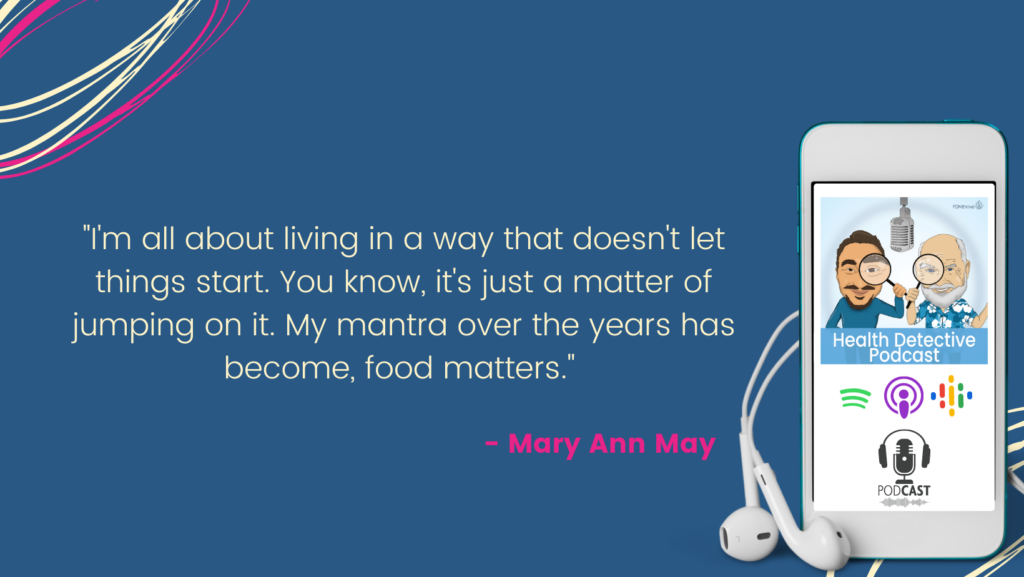
And I’m all about living in a way that doesn’t let things start. You know, it’s just a matter of jumping on it. My mantra over the years has become, food matters. Like it really does.
Food is Information in Midlife Health
When my mom had ALS for example, we had a woman from Poland who was in the house caring for her, cause she needed nonstop care. One of the things she brought back from Poland and my mom was in bed and she couldn’t move. So a lot of people know about sores – bed sores – because you’re not moving and stuff. She swore that blueberries in a drink, she would make a blueberry drink for my mother every day. My mom never had bedsores. She had a problem where she had to go to a hospital for a potential blood clot. She was there four days and she came home with bedsores.
It’s just amazing the properties of food. Food really does matter. I mean, we saw it with my daughter. We saw it with my mother, and you know, just good food. You have to figure out where you can get the best food that you can, because it really does matter.

I mean, food is information. It tells your body what to do. And the food that you’re eating actually becomes your body. Like the amino acids from the protein become your muscle. So, you want it to be the best you can. You got to look into that.
[00:28:13] Detective Ev: There’s so many additional complexities in today’s world with the diet thing. One, I always just find it amazing that we’ve moved so far away from our natural lifestyles. We’re as smart as we are, but we’re the only animals that need dieticians and nutritionists. The bird knows what to eat. Right? The bear knows what to eat, the foxes know what to eat. They don’t think about those things.
Mary Ann May: Unless you’re Hank the Tank.
Plants Soak up the Environmental Toxins
So, we’re the smartest, apparently, yet we’re the only ones that can completely override our instinct, so we don’t even know what to be doing anymore. Then add to that, the food quality. There’s lower nutrients than before, but there’s also a higher toxic load.
I think this is what people forget about. There’s some people, obviously in the world of FDN, we’re not dogmatic with the diet, but generally speaking, I mean, we’re almost universally recommending animal protein to people in some amount. It might look different for you and me, but it’s never really a vegan thing.
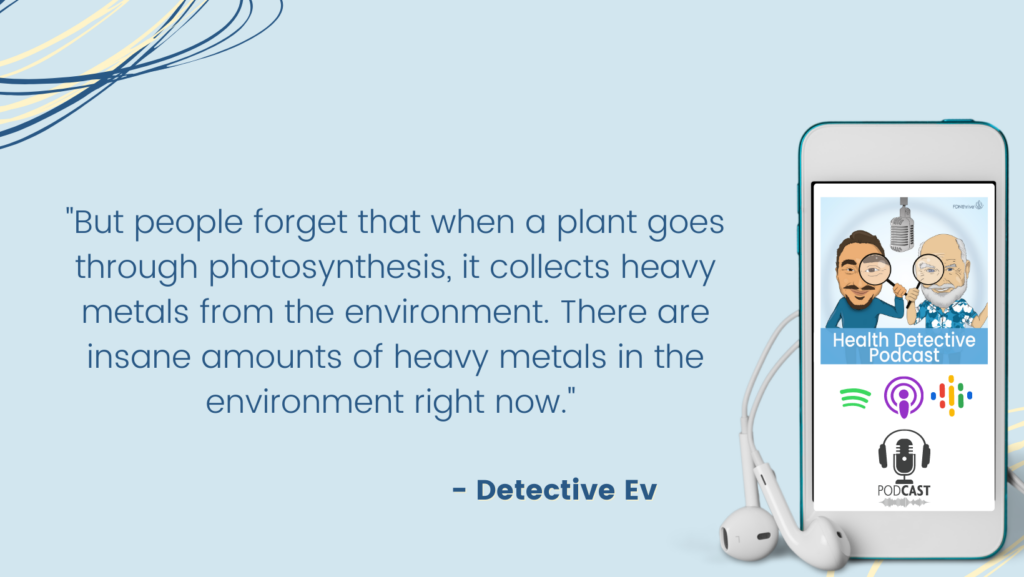
I’ve done a vegan thing. I’m not hating on it. I actually think it’s a very admirable goal to not want to kill animals to do this. I think that’s amazing. But people forget that when a plant goes through photosynthesis, it collects heavy metals from the environment. There are insane amounts of heavy metals in the environment right now.
So, should we be concerned about certain seafood? Absolutely, as you already brought up. But people don’t put plants and tuna fish in the same category, and I’m a lot more worried about access vegetables now unfortunately in today’s world. I’m not saying this always would have been the case. But in today’s world, I’m more worried about that sometimes than I am the fish.
Now that’s not to say to be loose with either, but we need to consider all of these things. The food thing has become quite complicated.
Dirty Dozen, Clean Fifteen
[00:29:41] Mary Ann May: Well, and the environmental working group does a great job with their dirty dozen. Honestly, there are some restaurants here in Dallas who do say they follow that.

The dirty dozen is just the top 12 foods that are the dirtiest when it comes to pesticides and chemicals, and they have a clean 15 on the other side. You know, they’re not testing everything, but they’re testing the higher consumed foods. What really is tricky is spinach and strawberries are always at the top.
I hate to say it, when I go to somebody’s house for food and they’ve got a fruit salad and there are strawberries in it, I’m not going to be the rude person and say, are those organic? No, I’m just going to say, you know what, I’m just not going to choose to eat that.
It’s just tricky because arugula isn’t on that list, so I generally will eat arugula at restaurants over spinach. Because unless they’re saying it’s organic, I think that’s going to be very heavy on my body with pesticides and whatever else is on it. So, I mean, it’s just about being thoughtful about what you’re eating, because it matters.
FDN Works for Midlife Health
[00:30:49] Detective Ev: I want to go back to your experience with the course for a second because you’re coming in as a relatively healthy person at the time, and then finding this stuff on the labs. It’s actually kind of interesting that we have these two extremes normally, where someone comes in and they’re one of the rare few, you know, they’ve done work on their health and they’re actually feeling pretty good.
Then on the other side is like the sickest people you’ve ever heard of going through FDN and it’s like, how is it useful for both? Well, it’s actually the same philosophy that makes it useful for both. FDN finds the things that the conventional world just does not find. So, if you’re someone that feels overall pretty good, but maybe it has some stuff to work on, yes, our philosophy is going to find that.
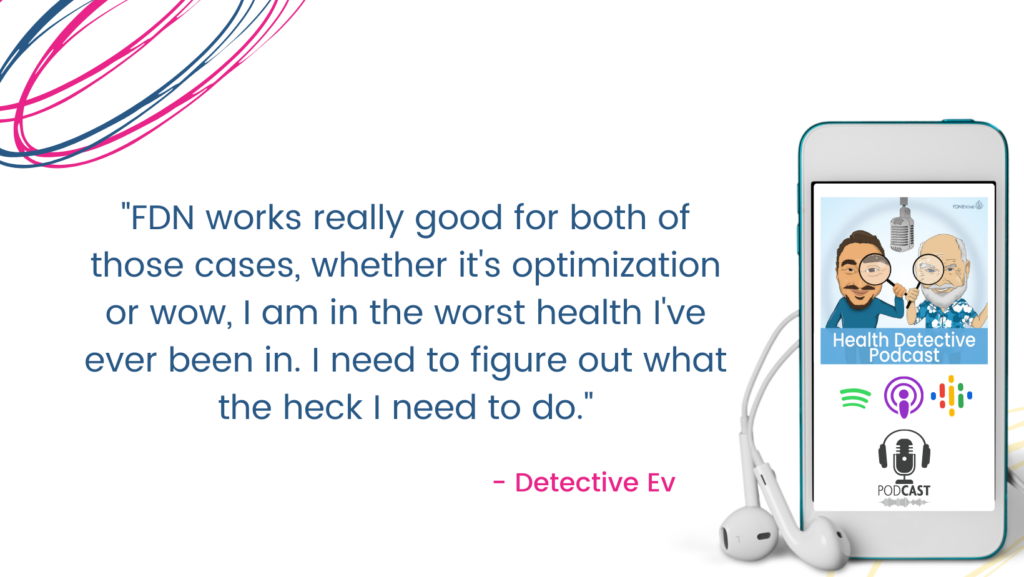
Similarly, if you’re someone who is super sick and conventional medicine is either telling you that your blood work looks normal or that everything’s fine, or that this is all we can do (they’ve given the medication or two, and they did try – this isn’t a condemnation towards it), but they did everything that their system allows for, but you’re still sick. FDN works really good for both of those cases, whether it’s optimization or wow, I am in the worst health I’ve ever been in. I need to figure out what the heck I need to do.
The Different Test Result Ranges
[00:31:49] Mary Ann May: That ties into exactly why I wanted to do this. Reed Davis talked about how he wanted through all his efforts, he wanted to be the last person that people saw. That resonated with me so much because I have a big family.
I was talking about this last year when I was first dabbling in like, you might have liver enzymes that are up and your doctor’s going to say, hey, just wait, let’s watch it. I’m saying this to one of my cousins and he’s just, that’s exactly what my doctor said. I said, why are you waiting? Why aren’t you doing something about it now? It doesn’t appear as if it’s going to just go away. It’s a sign that something’s not right. I think that’s the key that people need to realize when your numbers look normal to a doctor, they’re looking at the range that the lab provides.

The interesting thing about this lab is that their range includes everybody. That’s the sickest, it’s the people who aren’t paying attention to things. So, when you’re on the low end, you’re really showing that you’re probably with the sick people and they’re just not accounting for that.
When we do our stuff with FDN, our numbers are always over because we are looking for the optimal range, not catch all – the bell crew that catches everybody – but just the things that really represent the biggest health markers. That’s what we’re trying to do is get people to realize there are things you can do. We look at health in a different way. Yes, if you break your leg or if you’ve got cancer, you have to go to your doctor, they’re going to help you.
Going Below the Surface for Midlife Health
There’s really good reasons to go to doctors. But there are things that they don’t look at the same way. It’s just a matter of you need to pivot in life and figure out who are the people that are going to support you in ways. A lot of people are in that gray zone where they think they’re okay, because they’re being told they’re okay. But they don’t feel exactly right. Those are the people that need to dig a little deeper.
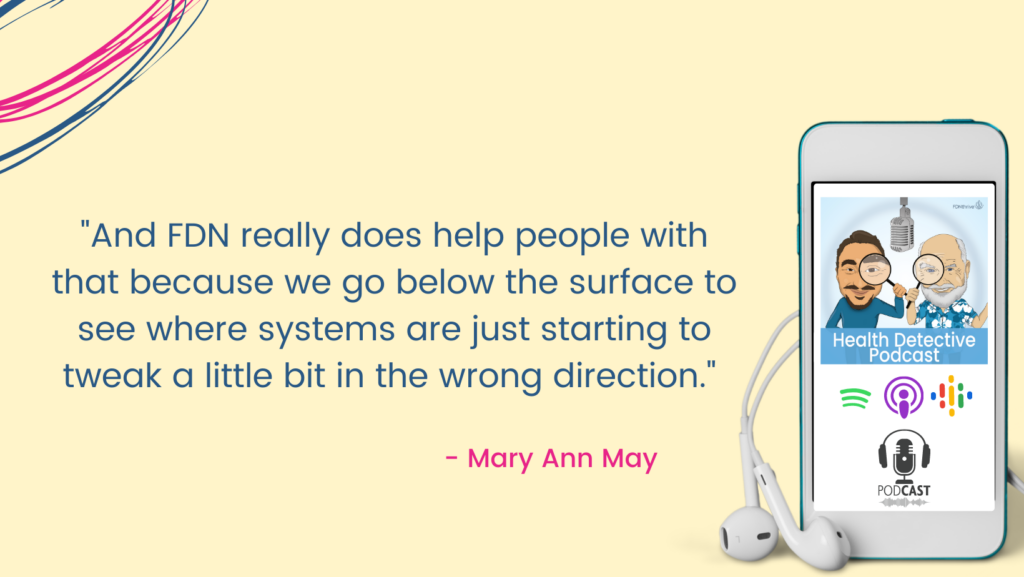
And FDN really does help people with that because we go below the surface to see where systems are just starting to tweak a little bit in the wrong direction. Instead of that going all the way down till you’re feeling your worst that they finally are going to say something’s wrong with you, why not catch it early and turn it around and learn to do things so that you’re living as vibrantly and as alive as you can.
[00:34:37] Detective Ev: So many things just well said there.
I love your objectivity because I find that’s universal in the world of FDN, but it’s not universal in the world of functional natural medicine. We need to recognize the strengths of Western medicine, guys. Anyone that listens regularly already knows my thoughts on this. This is not a one versus the other. But at the same time, it’s amazing.
This is Insane
I don’t engage with this anymore, thankfully, but when I first got into this, all the debates with family members or friends. Like, oh, you think you know more than a doctor! And it’s like, first of all, no. Second of all, it’s not that simple.
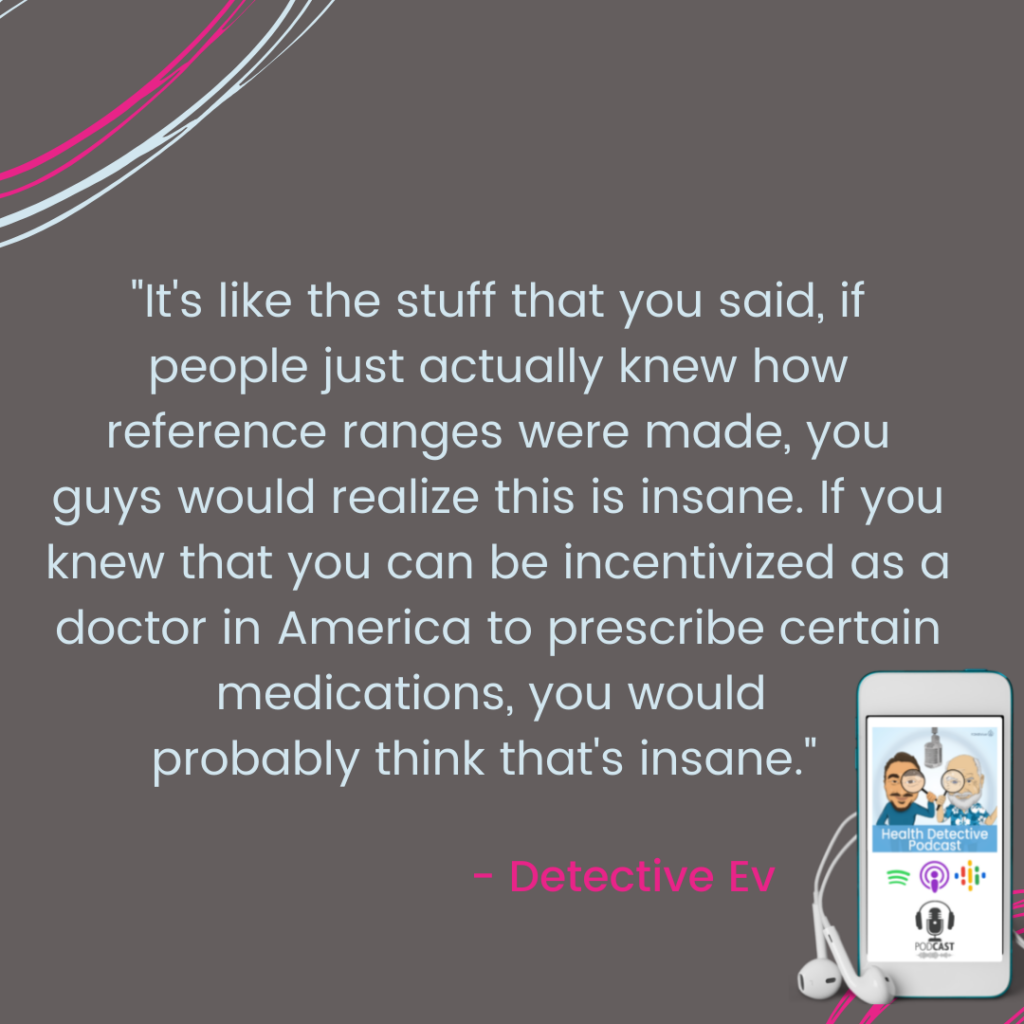
It’s like the stuff that you said, if people just actually knew how reference ranges were made, you guys would realize this is insane. If you knew that you can be incentivized as a doctor in America to prescribe certain medications, you would probably think that’s insane.
If you knew that were one out of two countries in the entire world (the other ones New Zealand), that allows direct to consumer pharmaceutical advertising, which means folks, only two countries in the world hear about Lunesta on their TV show with the little cute butterfly that tells you you’re going to fall asleep all nice or whatever, you know what I mean? Or whatever that was for, it might’ve been a depression one. No, that’s not allowed other places because they realized that’s probably a bad idea.
We need to just be aware of these things and it doesn’t take much. I can just tell anyone who’s never even read one book on this, you don’t have to do much research to start thinking, wow, is that how it should be? You’re like, I don’t know if that makes sense or if I agree with that, but people never even go and check that out.
What’s Our Royal Jelly in Midlife Health?
They think it’s a battle of one versus the other. That’s not the case. Use Western medicine always as a life jacket to keep you afloat – acute situations – that’s fantastic. But if you’re someone that’s been out there for 10 years with the same health issues, and you’ve been going to the doctors, well, you don’t need us to tell you that it’s not working.
It’s clearly not. Something else needs to be tried at that point. I think this show now having 120 something episodes, we’re going to keep going, right? This is just more and more proof that not only does this system work, it works consistently for a variety of different health issues because we’re not treating anything specifically.
[00:36:30] Mary Ann May: Absolutely. And going back to the whole food thing, I love this example to be honest, food is information. The best way to look at that is in the bee population. I just heard this again last weekend, and it’s just so clear, worker bees and the queen bee have the exact same DNA. Exactly.
What does the queen bee get fed? Royal jelly. What do the worker bees get? They get pollen and nectar. Worker bees work, and they live for a couple of weeks. The queen lives for years, and she is able to produce colony after colony after colony, and it’s only because she’s fed royal jelly.
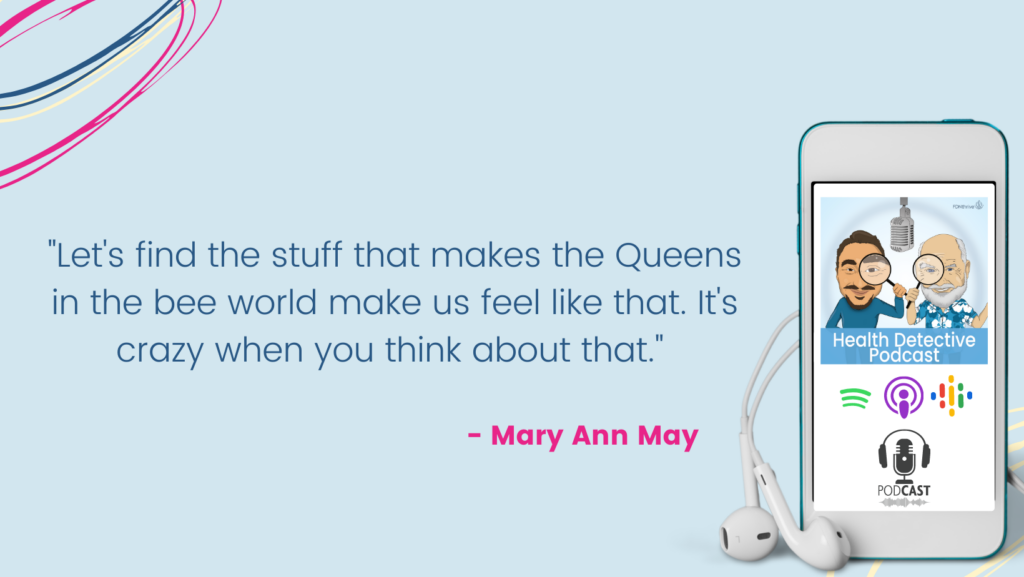
What are humans’ royal jelly? We’ve got to figure out where we have royal jelly because, literally, we have similar DNA. We have tweaks that make us all unique, but the bottom line is food is information. Let’s find the stuff that makes the Queens in the bee world make us feel like that. It’s crazy when you think about that.
Missing Keys to Unlock Potential in Midlife Health
[00:37:39] Detective Ev: I didn’t know that at all. That’s cool. I wouldn’t have known how long the queen bee lives. I wouldn’t have known that the DNA’s the same. And I definitely wouldn’t have known about the royal jelly. I guess the pollen thing is the only thing I would have known.
[00:38:01] Detective Ev: Sweet. So, we’ll transition a little bit for the last 10 minutes here to make sure we get everything in. In a second, we’ll talk about where people can find you. But I’m curious since, relatively, you’re a new graduate. In the grand scheme of things, who are you finding that you want to work with? I know that you’ve kind of already alluded to it in this show, but I always love to hear it directly from the person.
Who’s your number one client? The person that has these characteristics, I’d love to work with them. I think that helps the audience realize if they should reach out to you.
[00:38:26] Mary Ann May: Yeah, I’m really looking for the person who’s in the mid part of their life, like I am, who has been focused on health, but they know that something’s wrong with them and they can’t figure it out.

I want to offer them the keys to understanding what’s going on in their body so that they can turn it around and feel better and live confidently and healthy for the rest of their life. Honestly, I feel like that’s what we’re doing with FDN is we’re finding missing keys to unlock the potential to get people back to where they need to be.
The Mid-life Health Focus
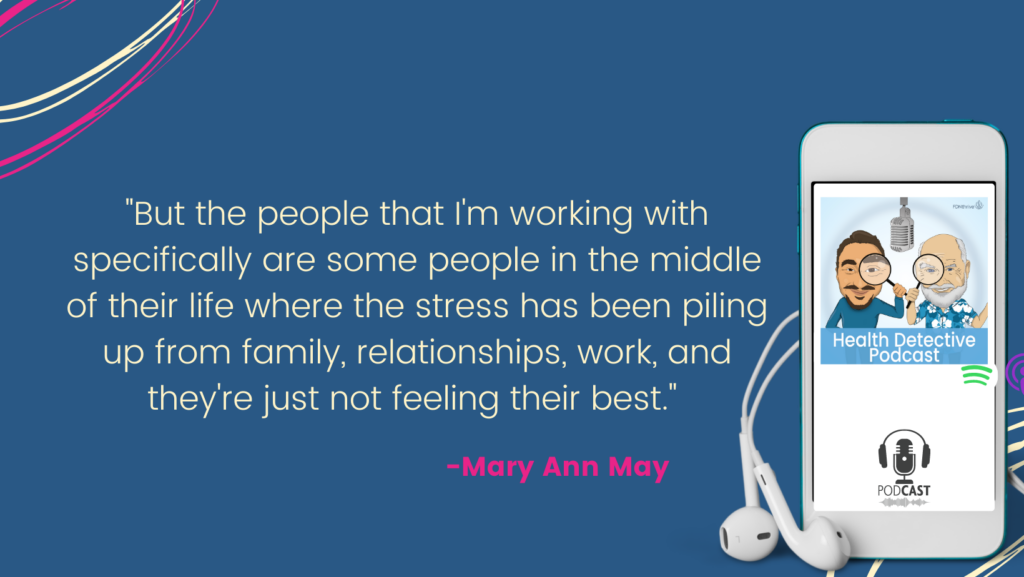
I do work with some youthful people because I’ve got kids and their friends learn and stuff like that. I try and talk to people about food of all ages. But the people that I’m working with specifically are some people in the middle of their life where the stress has been piling up from family, relationships, work, and they’re just not feeling their best.
They know they’ve got some things going on, whether they’re not sleeping, they’re not digesting well, they don’t have the energy. It’s just trying to figure out how best to get them feeling their best so that they wake up refreshed. They have the energy of the day. They’re digesting their food as best they can. So, they’re getting the nutrients in their system to be as good as they can be.
Where to Find Mary Ann
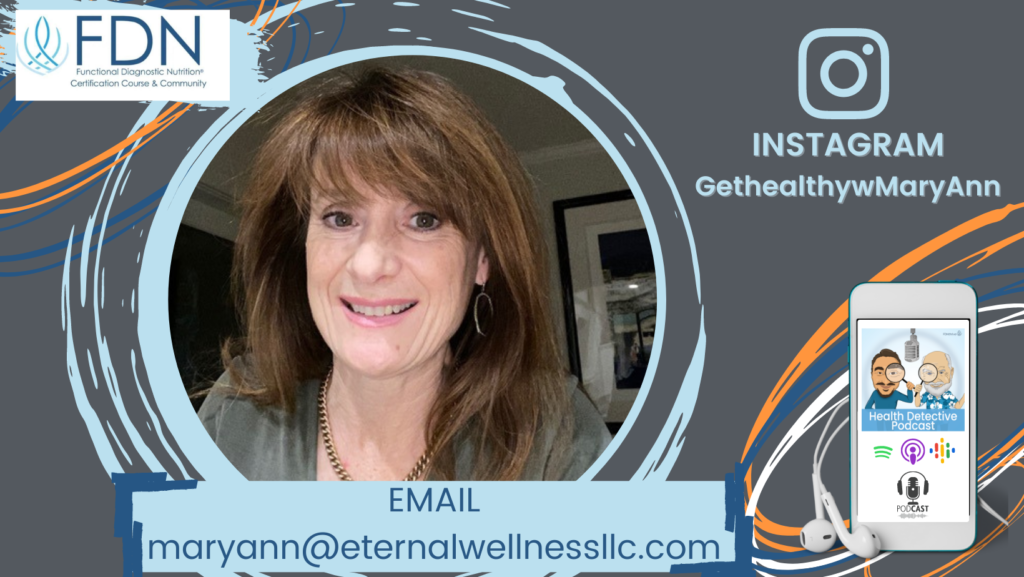
[00:39:47] Detective Ev: Excellent. Where can people find you if they’re interested in that?
[00:39:50] Mary Ann May: I am just starting my Instagram and it’s get healthy with Mary Ann and with is a “w” so it’s gethealthywmaryann that’s M A R Y A N N. It’s just a really great honor to be on this.
I’m all about it is all I can say. I’m really excited about this.
[00:40:07] Detective Ev: Perfect. Before we finish up with the signature question, we have some time. So, I’m going to just rapid fire, a few things. One is the FDN community. Was that something that you were expecting when you first joined? Did you know it would be that cool, because it’s amazing?
[00:40:18] Mary Ann May: I had no idea about that. I was hook, line, and sinker from Reed. Then the AFDNP – the professional program – you can get in; it is so much bang for your buck. You are getting webinars. You are getting a community that can help you with things. There’s so many resources that are at your fingertips. Discounts for things. All the support you could need to be a successful person is right there with all the people that have done this before you.
There are so many resources to make you successful that you could make your own business, whatever you want. There are so many different ways to address this. Whether you want to do group programs, whether you want to target certain areas or certain people, there’s support everywhere you look. It’s really an amazing community.
Personal Development Matters
[00:41:10] Detective Ev: I love that you mentioned that because there’s people doing completely different things sometimes. Like I speak on the topic. I take a very different route with this. You can become an educator. Some people have their own YouTube channels. Ben Azadi’s done very well for himself. I think he’s got like a hundred thousand subscribers on YouTube, and he educates on this stuff. He speaks all over the place. He has his own brand now with this. He has multiple bestselling books. It really is sky’s the limit.

It goes to show that personal development also matters in the world of health because all the tools are there. There are some people that have never taken an advanced course, even though FDN offers a bunch of them, and they are killing it helping a ton of people, making great income. Then we have others that take every advanced course under the sun, and they still have some troubles with that.
That is not to be discouraging by any means. In fact, it’s the exact opposite. It’s to be encouraging that, hey, if we do the work on ourselves too, outside of just the health stuff, just going through the FDN course separates you so far away from most everyone else. You’re going to be able to help a ton of people and have a successful business that people want to pay you to utilize the services.
Anyway, if you do the advanced courses then you can step into a completely different realm like the Ryan Monahans of the world, where now he can mentor FDNs and do his own practice. That guy’s just on a different level for sure. But you don’t even need to do that to have a successful practice here.
A Lot of Work Needs to Be Done
The community is great. People have done it before. It’s been around for 13, 14 years. There’s hardly anything new that’s coming up in my opinion. What’s cool with the pandemic over the last two years (the only cool thing about it maybe) is that FDN was doing virtual before it was “in”.
So many people were flooding into FDN because it’s not like we were one of those businesses that just said, okay, well, we’ll start going online because we have to. It’s like, no, that was the choice of most practitioners long before COVID was a thing. They’re like, well, wait, I can do this in an office, or I could do this online.
Yeah. Most people choose online if given both of those options. And you could work with people all over the world. It’s cool the people that you meet through this. Like I’m meeting you and we’re talking across the country now. I think that’s amazing. It’s fantastic.
So, what’s your goal now? This will be my final business question. Is your goal now to just, hey, I want to do this like as a full-time practice? Where do you see this in a couple of years going?
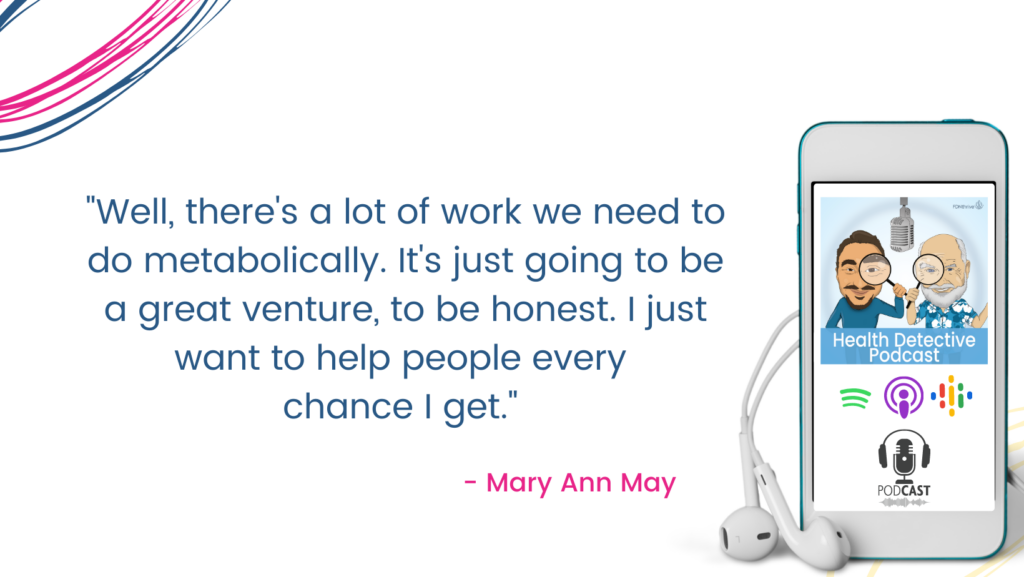
[00:43:15] Mary Ann May: I see this growing. I am going to be all-in doing this. I’m going to run group programs. I’m going to be really expanding to learn through some of the advanced classes and do things for metabolic health and things like that. As we’ve heard, 12% of Americans are metabolically healthy. Well, there’s a lot of work we need to do metabolically. It’s just going to be a great venture, to be honest. I just want to help people every chance I get.
Signature Question – Magic Wand
[00:43:42] Detective Ev: Cool. All right.
Well, we will finish up today with the signature question on the Health Detective Podcast. It is as simple as this. If we could give Mary Ann a magic wand and you could get every single person in this world to do one thing for their health or stop doing one thing, what is the one thing you’d get them to do?

[00:44:00] Mary Ann May: It’s pretty easy. Stop eating sugar. Just get all the sugar and the carbs that are not healthy for you out. And just pay attention to the other foods.
[00:44:13] Detective Ev: I think it is so cool when, again, someone has been involved in this space for so long and yet they give a tip that many people would consider, let’s be honest, kind of simple and straightforward.
Now, simple, of course, doesn’t always mean easy. But that tip is not necessarily something you haven’t heard before and yet, are you actually doing it? That’s what I wonder. This woman’s been studying this stuff for 20 plus years. Obviously very intelligent. Obviously very well versed in it. Yet that’s her tip that she’s sharing with us is to remove sugar and unnecessary carbohydrates.
Cutting Out the Sugar
On a side note, I actually listened to a really interesting podcast recently by this guy, Ben Azadi. He has a podcast called Keto Camp. We will absolutely plug him on this because he is an FDN, and his podcast is huge. Go check that out sometime.
He had a guy on there, who was like 20 or 30 years, this person had not had sugar. They just don’t allow it into their lives anymore. They claimed that they were a sugar addict. They want nothing to do with it. And I think there are so few people out there in today’s world that are doing something like this. I will be very fascinated to see how long this guy lives and what his life looks like.
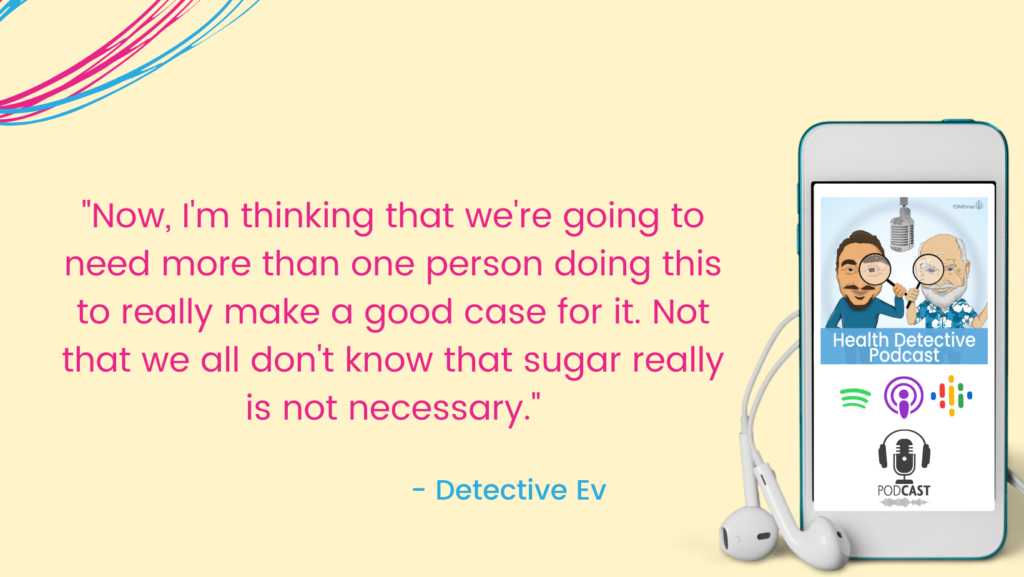
Now, I’m thinking that we’re going to need more than one person doing this to really make a good case for it. Not that we all don’t know that sugar really is not necessary. But still, if he lives to a hundred, someone can still write this off as, oh well it’s only one person doing it. There’s plenty of people that eat crap and live to a hundred. Okay, fine. So, we need some other volunteers that want to join in on that.
I’m not sure if I’m ready yet. There are some great paleo snacks out there that I’m very much addicted to, and I’m not really willing to give those up yet. But I’m getting close. So, if you’re willing to do that, let us know. Or if you’ve cut out sugar for a while, and I mean like years, I’d be curious about that.
FDN Course
So, check us out on the Health Detective Podcast by Functional Diagnostic Nutrition on Podbean. Leave a comment there and tell us how long you have done something like this. But with that said, if you want to check out the course, you just got to go to functionaldiagnosticnutrition.com.
You can actually click BOOK A CALL and we do free calls pretty quickly. You can get on with someone usually within the next few days. Actually, you can call at almost any time. There’s usually someone operating the phone from about 9:00 AM EST to 7:00 EST like PM. You can call in, talk to someone about it, see if it’s right for you.
Because the truth of the matter is FDN is not perfect for everyone. I always kind of tell people, I’d say, the biggest differences here are, if you’re looking for a true coaching program (and I mean, something that teaches you the skill of coaching), FDN is not really that. It was never supposed to be that. Although we do offer an advanced course now, which is actually fantastic. So, if you’re someone who wants to do the coaching and not spend $5,000 to $10,000 to do it, all you got to do is take our advanced course.

I think it’s like $900 or something like that, which is so much cheaper than the rest of the industry. But with the main course itself, it’s actually highly technical and just gets right into the science of lab analysis and truly getting your clients better. We’re not doing all the fluff and mixing stuff in that doesn’t need to be there.
Conclusion
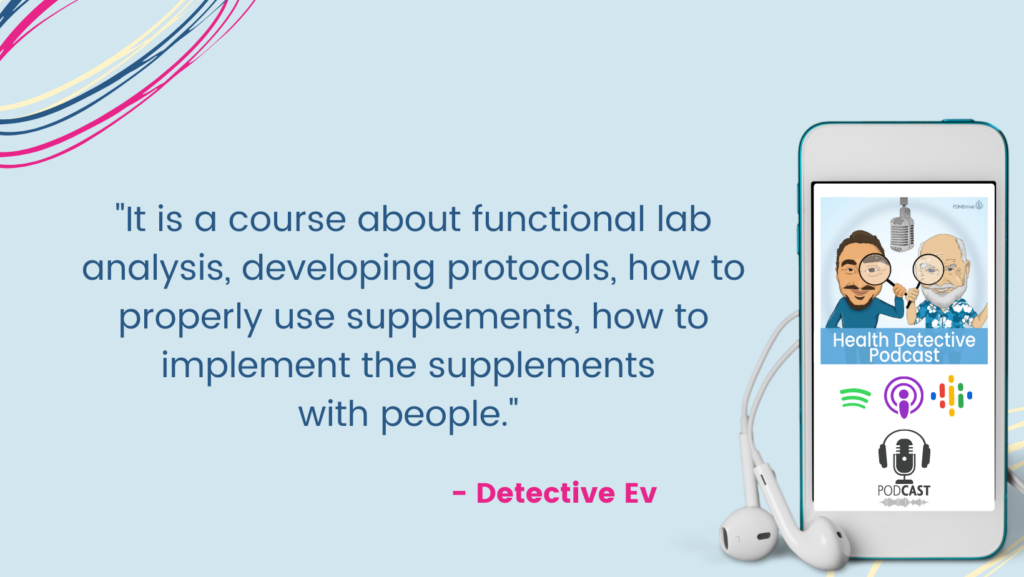
It is a course about functional lab analysis, developing protocols, how to properly use supplements, how to implement the supplements with people. What to do if they’re maybe reactive to a lot of the things that you give them, hypersensitive clients, all that type of stuff. Right? So, you can find the course at functionaldiagnosticnutrition.com.
And of course, if you resonated with Mary Ann, you know where to find her. You can just go to the show notes and check out her links there.
But with that said, we’d like to thank you for listening to yet another episode of the Health Detective Podcast. If you would be so kind as to leave us a review on Apple and or Spotify, guess what, we would love you even more than we already do.
I’m looking forward to talking to you guys again soon and take care. Until then, thanks.
[00:48:03] Outro : Thanks for tuning in to the Health Detective Podcast. If you are finally ready to work with a real health detective on your health journey so that you can get well and stay well naturally, visit us at fdnthrive.com and click the button to schedule a FREE HEALTH REVIEW.

